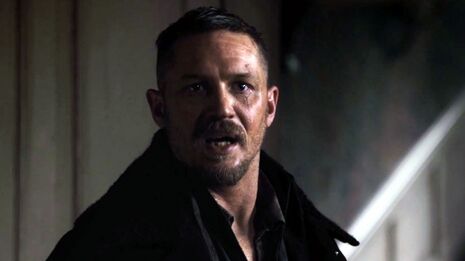TV Round-Up: Taboo (Part Four)
The final instalment of Anna Ellis-Rees‘s breakdown of the BBC’s latest period drama…

After eight episodes of gunpowder, gin and gore Tom Hardy’s critically acclaimed Taboo has come to a conclusion. Having had mixed feelings throughout, I did not complete my experience with any drastic change in opinion. The final instalment was, as expected, undoubtedly more captivating than episodes before it, but certainly not enough to make the series a success as a whole.
Taboo has become known for its slow-burn, and while it certainly did end, quite literally, with an explosion, it came too late. The excitement and tragedy of the last few scenes did not make up for the endless lack of resolutions in previous episodes. The gritty world that Hardy and Knight have created is abundant with enthralling characters and storylines that remain criminally underdeveloped.
“Sophisticated in its stylistic presentation, but sloppy in its development, it is not a drama to be disregarded nor to get too excited about”
As the credits of the final episode rolled, I couldn’t quite believe how much had been tossed aside. For one, after an eventful build-up to Zilpha’s murder of Thorne, her extremely short-lived relationship with Delaney was rushed with her suicide, an undeserving conclusion. No attention was given to how their incestuous relations begun or to the seemingly telepathic connection that Delaney claimed they had. For such a significant part of the story, Zilpha’s demise was a wasted opportunity. Conversely, Mark Gatiss’s memorable portrayal of the Prince Regent excelled in this final part, making it a shame in retrospect that he was given such a small dosage of screen time.
But what remained frustrating from the start of the series to its finish was the unresolved mystery of what Delaney did in Nootka. His surreal flashbacks to the island were the story’s main enigma, and for a lead to barely have been developed is hugely disappointing. Instead, what is left is a rather exoticised image of Africa that plays counterpart to the deeper message of the show. There is, of course, talk of a second series where these questions may finally be answered. However, a first series should end on a strategic cliffhanger but what we are left with instead is a mess of plot holes.
Nonetheless, the ultimate message of Hardy’s story often manages to transcend its shortcomings. The major themes of Taboo are certainly thought-provoking; Hardy pushes his audience to question the origins of morality and, through defying our expectations of what may seem to be clichéd characters, encourages us to consider societal misconceptions. The meek Zilpha is in the end defined by her illicit sexuality; Sir Stuart Strange sacrifices his patriotism for his own reputation; the innocent Winter refuses to be a part of her mother’s brothel.
Delaney himself is the epitome of misconception, an extremely violent and corrupt man who also has a higher knowledge of the world. Delaney describes his final pilgrimage for the East India Company (to cross-dressing prostitute, Godfrey) as a place where “there will be no rules and there will be no judgment”. This reveals the true relevance of ‘taboo’: what a society deems to be right or wrong is subjective, particularly in relation to the issue of sexuality, a message that is more important today than it is within the context of the show.
Overall, Taboo had all the correct ingredients for a smash-hit period drama: immensely detailed mise-en-scène of a macabre society, fervent performances of complex characters, and a thought-provoking tale of moral corruption. But the series’ major flaw was the imbalance of said ingredients. Sophisticated in its stylistic presentation, but sloppy in its development, it is not a drama to be disregarded nor to get too excited about. While there was much to learn from Taboo, I doubt I’ll be crossing off the dates until series two
 News / SU reluctantly registers controversial women’s soc18 December 2025
News / SU reluctantly registers controversial women’s soc18 December 2025 News / CUP announces funding scheme for under-represented academics19 December 2025
News / CUP announces funding scheme for under-represented academics19 December 2025 Features / Should I stay or should I go? Cambridge students and alumni reflect on how their memories stay with them15 December 2025
Features / Should I stay or should I go? Cambridge students and alumni reflect on how their memories stay with them15 December 2025 Fashion / The art of the formal outfit 18 December 2025
Fashion / The art of the formal outfit 18 December 2025 News / Dons warn PM about Vet School closure16 December 2025
News / Dons warn PM about Vet School closure16 December 2025









